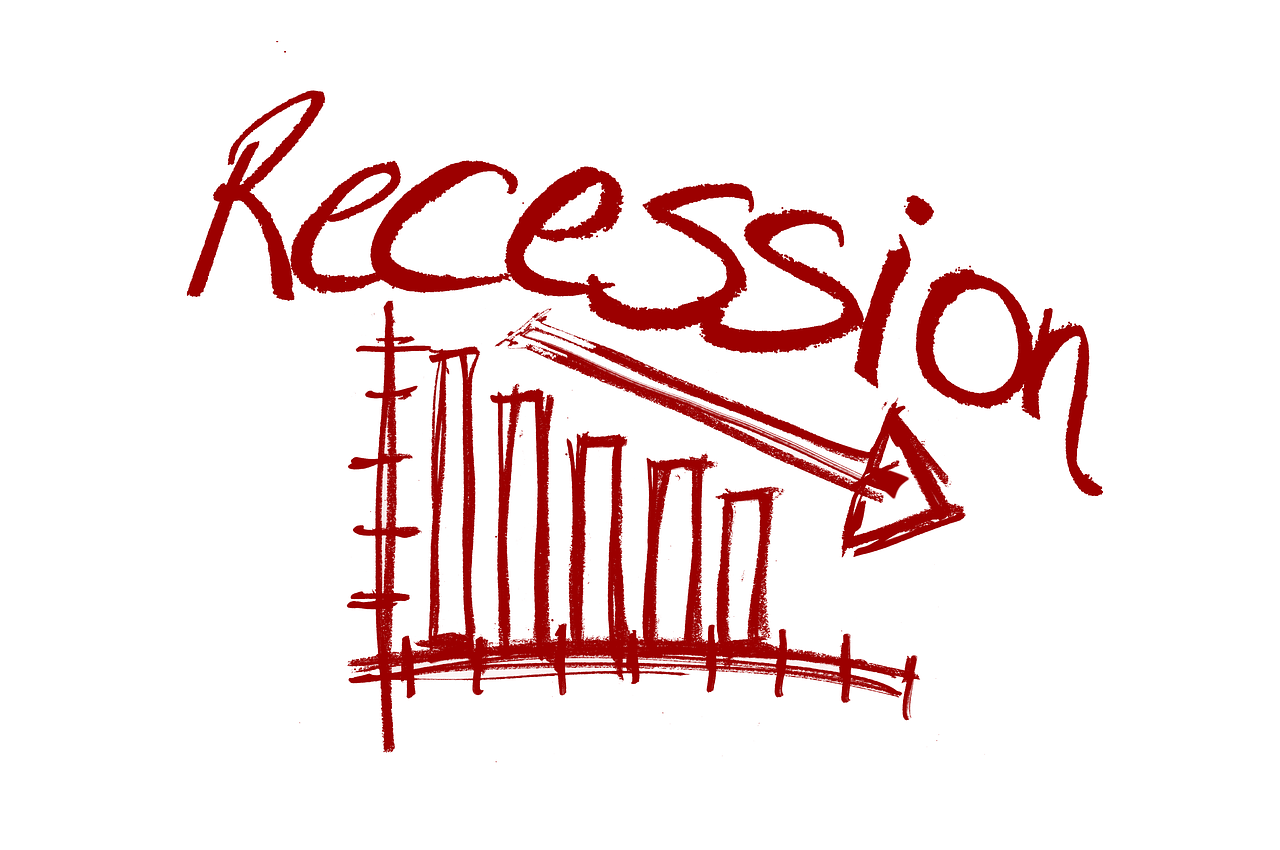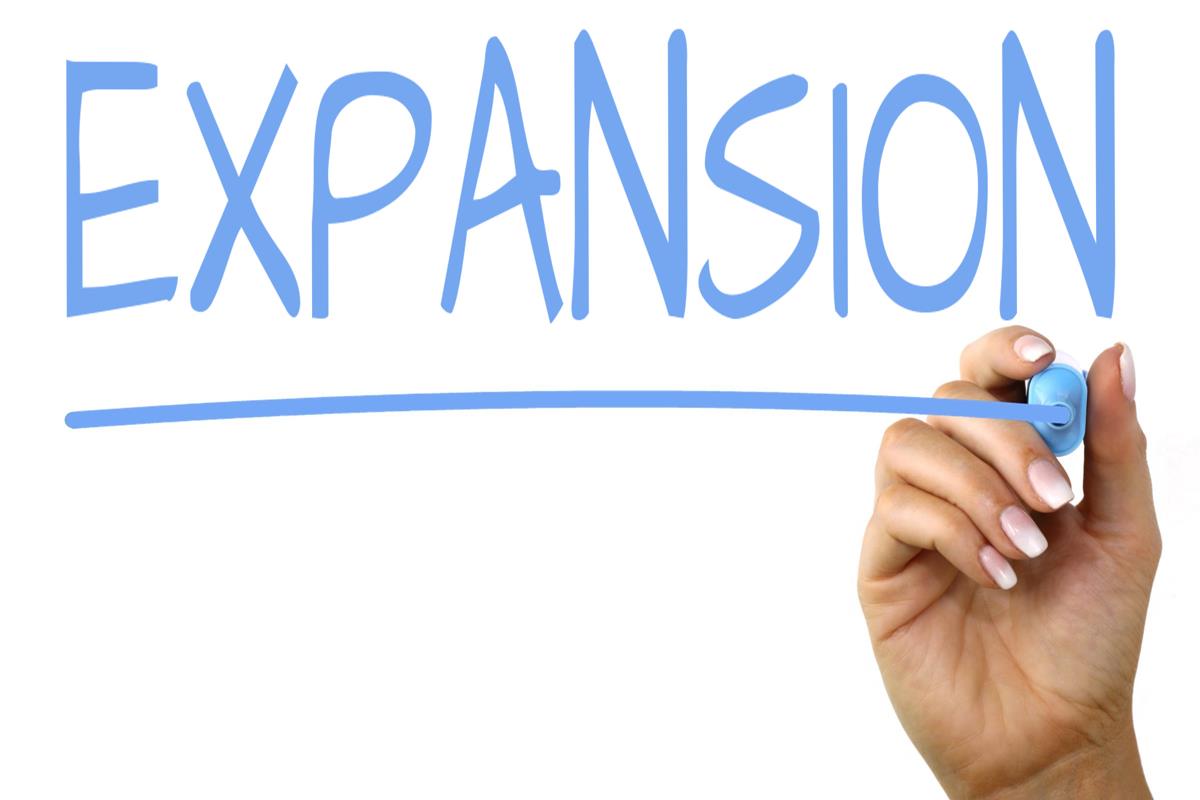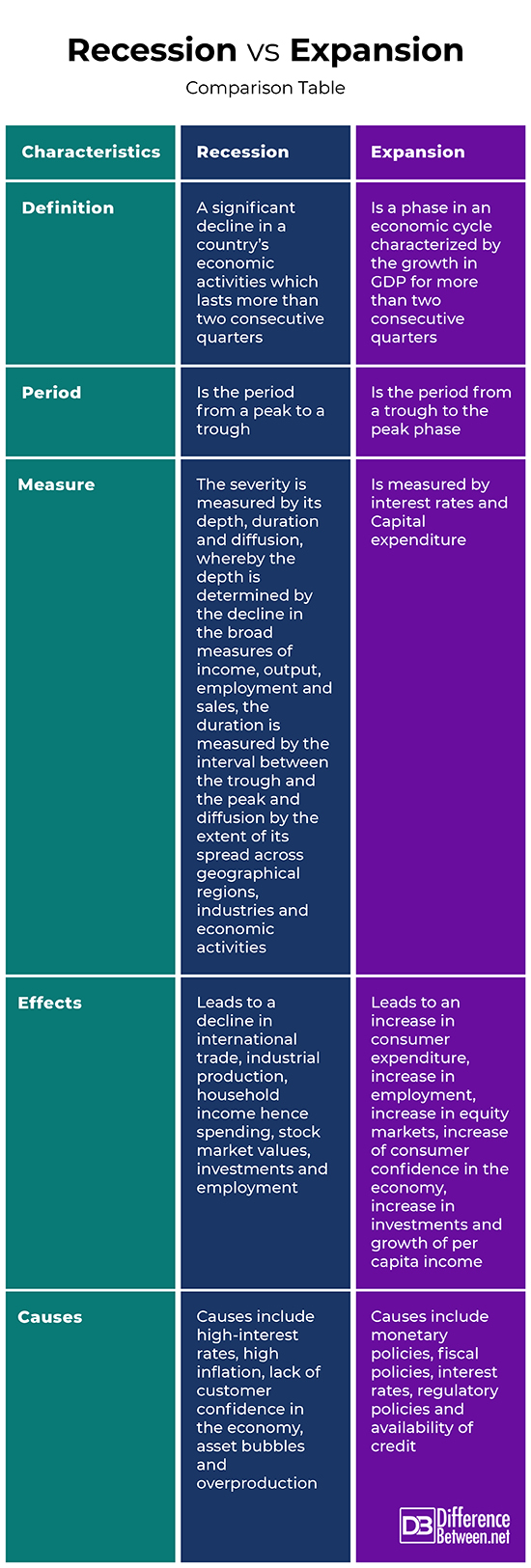Difference Between Recession and Expansion
The alteration of aggregate economic activities commonly referred to as business cycles, is inevitable. It can be defined as the expansion and contraction in economic activities around a growth trend, usually long term. Although not periodic, these sequences of change often affect economic activities in a nation through trade, sales, employment, industrial production and income. The business cycle has four phases, namely a contraction, expansion, peak and trough, in no order whatsoever.

What is Recession?
This is a significant decline in a country’s economic activities which lasts more than two consecutive quarters. It begins after an economies peak in activities and ends at an economies’ trough.
It is characterized by a decline in;
- International trade
- Industrial production
- Household income hence spending
- Stock market values
- Investments
- Employment
Although the causes of recessions are complex and often interrelate, some of the causes include;
- High-interest rates
- High inflation
- Lack of customer confidence in the market
- Asset bubbles
- Overproduction
The severity of a recession is measured by its depth, duration and diffusion. While the depth is determined by the decline in the broad measures of income, output, employment and sales, its duration is measured by the interval between the trough and the peak. Diffusion is measured by the extent of its spread across geographical regions, industries and economic activities.

What is Expansion?
This is a phase in an economic cycle characterized by the growth in GDP for more than two consecutive quarters. An expansion moves the business cycle from a trough to the peak phase. Indicators include unemployment claims, weekly working hours in a manufacturing setting, building permits and consumer goods orders. The best measures of expansion however include interest rates and Capital expenditure.
An expansion is characterized by;
- An increase in consumer expenditure
- An increase in employment
- An increase in equity markets
- An increase in consumer confidence in the economy
- Increase in investments
- Growth of per capita income
Some of the factors that may lead to an expansion include;
- Monetary policies
- Fiscal policies
- Interest rates
- Regulatory policies
- Availability of credit
Although expansions last an average of four years, they can last between 1 year and 10 years, and even more.
Similarities between Recession and Expansion
- Both are measured by GDP
Differences between Recession and Expansion
Definition
A recession is a significant decline in a country’s economic activities which lasts more than two consecutive quarters. On the other hand, an expansion is a phase in an economic cycle characterized by the growth in GDP for more than two consecutive quarters.
Period
While a recession is a period from a peak to a trough, expansion is a period from a trough to a peak.
Measure
The severity of a recession is measured by its depth, duration and diffusion, whereby the depth is determined by the decline in the broad measures of income, output, employment and sales, the duration is measured by the interval between the trough and the peak and diffusion by the extent of its spread across geographical regions, industries and economic activities. On the other hand, expansion is measured by interest rates and Capital expenditure.
Effects
A recession leads to a decline in international trade, industrial production, household income hence spending, stock market values, investments and employment. On the other hand, an expansion leads to an increase in consumer expenditure, an increase in employment, an increase in equity markets, an increase of consumer confidence in the economy, an increase in investments and growth of per capita income.
Causes
Causes of a recession include high-interest rates, high inflation, lack of customer confidence in the economy, asset bubbles and overproduction. On the other hand, causes of expansion include monetary policies, fiscal policies, interest rates, regulatory policies and availability of credit.
Recession vs. Expansion: Comparison Table

Summary of Recession vs. Expansion
A recession is a significant decline in a country’s economic activities which lasts more than two consecutive quarters. It is the period from a peak to a trough and leads to a decline in international trade, industrial production, household income hence spending, stock market values, investments and employment.
On the other hand, an expansion is a phase in the business cycle characterized by the growth in GDP for two or more consecutive quarters. It is the period from a trough to the peak phase and leads to increase in consumer expenditure, increase in employment, increase in equity markets, increase of consumer confidence in the economy, increase in investments and growth of per capita income.
- Difference Between Profit Center and Investment Center - July 2, 2022
- Difference Between Anti-Trust and Anti-Competition - June 6, 2022
- Difference Between Stocktaking and Stock Control - June 6, 2022
Search DifferenceBetween.net :
Leave a Response
References :
[0]Sherman Howard. The Roller Coaster Economy: Financial Crisis, Great Recession, and the Public Option: Financial Crisis, Great Recession, and the Public Option. Routledge Publishers, 2015. https://books.google.co.ke/books?id=0vQvCgAAQBAJ&pg=PA54&dq=Difference+between+recession+and+expansion&hl=en&sa=X&ved=0ahUKEwioi5ztydnpAhVCJBoKHTZsCkUQ6AEIJTAA#v=onepage&q=Difference%20between%20recession%20and%20expansion&f=false
[1]Sherman Howard. The Roller Coaster Economy: Financial Crisis, Great Recession, and the Public Option: Financial Crisis, Great Recession, and the Public Option. Routledge Publishers, 2015. https://books.google.co.ke/books?id=0vQvCgAAQBAJ&pg=PA54&dq=Difference+between+recession+and+expansion&hl=en&sa=X&ved=0ahUKEwioi5ztydnpAhVCJBoKHTZsCkUQ6AEIJTAA#v=onepage&q=Difference%20between%20recession%20and%20expansion&f=false
[2]International Monetary Fund. FDI Flows to Low-Income Countries: Global Drivers and Growth Implications. International Monetary Fund, 2010. https://books.google.co.ke/books?id=YjJ1KaQQzUQC&pg=PA11&dq=Difference+between+recession+and+expansion&hl=en&sa=X&ved=0ahUKEwioi5ztydnpAhVCJBoKHTZsCkUQ6AEIcTAJ#v=onepage&q=Difference%20between%20recession%20and%20expansion&f=false
[3]Meeropol M & Sherman H. Principles of Macroeconomics. M.E. Sharpe Publishers, 2013. https://books.google.co.ke/books?id=_QgAAAAAQBAJ&pg=PA227&dq=Difference+between+recession+and+expansion&hl=en&sa=X&ved=0ahUKEwioi5ztydnpAhVCJBoKHTZsCkUQ6AEILjAB#v=onepage&q=Difference%20between%20recession%20and%20expansion&f=false
[4]Image credit: https://storage.needpix.com/rsynced_images/recession-2530812_1280.png
[5]Image credit: https://www.thebluediamondgallery.com/handwriting/images/expansion.jpg
